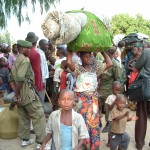Regime changes in Burundi, Congo Democratic, Uganda and Rwanda have affected not only the disintegration and collapse of the ownership society that had existed, but facilitated the collapse of religious and traditional authority that had played key moral, spiritual and ethical roles and had replaced them with unrealistic policies and processes with generational if not multi-generational violence and war as unintended consequence.
A quick observation of the behavior of refugees and internally displaced people in this region is instructive. When a village is attacked, residents fleeing from the village always take what they can carry of their own possessions. Even though they don’t know where they are going or how far and how long will be their exile, they do not leave behind what they perceive to be their possessions.
In order to achieve comprehensive and balanced solutions to systemic and structural violence and in order to realize a “JustPeace Society” in Burundi, in the north- eastern DRC provinces of Bukavu, Goma and Kisangani, in Uganda and Rwanda, two simultaneous strategies are required, namely: economic development and Peacebuilding.
The idea that development or progress flows naturally from a national reconciliation process would seem to be an assumption devoid of reality. No modern country featuring a strong economy such as the United States, Germany or China convened a national reconciliation conference for the express purpose of creating or realizing wealth.
Rather, study after study has demonstrated that the road to hope and change toward a better future is the preserve of countries with vision and managerial capacity to create economic opportunities, including well-paid jobs, access to credit for all, savings for the benefit of future generations, the production and exportation of manufactured
goods, the protection of property rights and investment in research and development.
In the case of Rwanda, Hutus and Tutsis, respectively, owned coffee plantations and cattle but lost everything when the Habyarimana Government was unable to protect the coffee farmers against the decline of coffee prices in 1985 and was unable to assist those who were losing their cattle to diseases or to design an equitable national land policy with regard to farming and grazing. In consequence, both communities lost everything they owned while the formal economy disintegrated in oblivion. Ethnic pride, nurtured and realized for generations, was transformed into national shame. The
genocide of 1994 was ‘the straw that broke the camel’s back’.
The ‘camel’ in this case, comprised both Hutu and Tutsi communities. The northern and southern regions of the DR Congo where all the atrocities were committed, was known traditionally as the bread basket of the country. In the fertile regions of Rutshuru, Masisi, Walikale, Bunia, Isiro lived people proud of themselves as owners of tea plantations, cattle and land. Today, following regime changes and measures such as the ‘Bakajika Law’ that authorizes the expropriation of ancestral land in favor of the State, the indigenous population has forfeited everything that had been achieved over generations. In reaction to these dynamics, young men and women have created local
militia movements known as the Mayi-Mayi. When asked why they
undertake these initiatives, the response is straightforward: “To
Protect what we own”.
It is in this context that democracy, good governance and transparency must be manifest in the conduct of elections and in the fight against corruption. These ideals must inform the movement toward the creation of an ownership society in the Great Lakes region where ‘nobody owns anything’.
In conclusion, life in these countries where the line between both societies the traditional and modern no longer exists, hope and change would and will have more meaning when people own their means of production and livelihood and when the government of the day promotes and protects that ownership structure. Any society that loses its sense of ownership of the means of its livelihood disintegrates and its citizens develop a sense of genocidal ennui.
For many the National Dialogue or conferences would and may be the space to rethink about the recreation of the lost ownership society but, a casual examination of the national dialogue and reconciliation conferences of a decade ago suggests that the social and political elites involved were keen and are keen on regaining political power and the related privilege and status. Meanwhile, a majority of the population that had expected change (and still are still) for a better future has been deceived or duped by the mantra of ‘African solutions to African problems’, “Ubuntu” and “Ujamaa”

